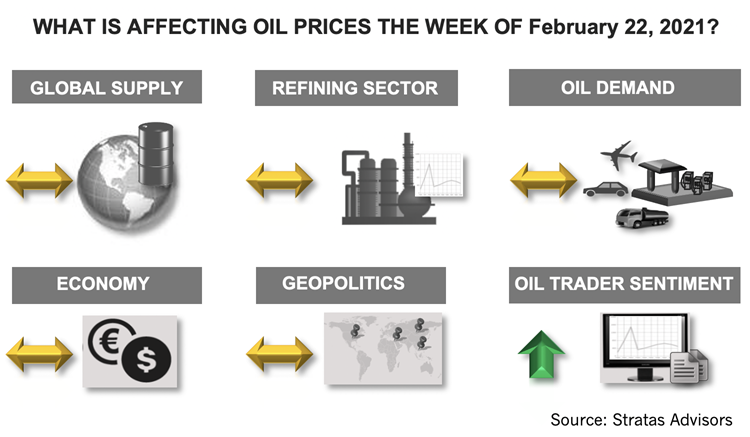
(Source: Shutterstock.com)
[Editor’s note: This report is an excerpt from the Stratas Advisors weekly Short-Term Outlook service analysis, which covers a period of eight quarters and provides monthly forecasts for crude oil, natural gas, NGL, refined products, base petrochemicals and biofuels.]
The price of Brent crude oil closed last week at $62.91 after reaching $64.34 on Feb. 17. As such, the price of Brent crude oil was essentially unchanged from the close of the previous week ($62.71). In similar fashion, the price of WTI closed last week at $59.24 (in comparison to the close of the previous week of $59.73) after reaching $61.14 on Feb. 17.
Last week ended the run-up in prices, which saw the price of Brent crude go from $55.04 on Jan. 29 to $64.34 on Feb. 17 before falling back by the end of the week.
While crude prices did not close much differently than the close of the previous week, some major developments occurred last week.
- The cold snap in Texas and neighboring states resulted in lost oil production of around 4 million bbl/d, which represents about 33% of total U.S. production. However, with the return of power and warmer weather the production is on its way to being back online.
- A development with potential for longer-lasting impact is Saudi Arabia indicating that it is likely to end its unilateral production cut of 1 million bbl/d after March. This development has the possibility of disrupting the OPEC+ framework (with the next meeting scheduled for March 4)—which is critical for the stability of oil prices.
- Another development that could affect oil supply dynamics is the Biden administration appearing to be ready to rejoin negotiations pertaining to the nuclear agreement with Iran—which could result in Saudi Arabia being less accommodative with respect to providing space for US shale production increases.
Looking forward to this week—there will be increased focus on the $1.9 trillion stimulus/recovery package that the Biden administration is attempting to push through the U.S. Congress. Any signs of this package being materially scaled down will be a big disappointment for the markets.
Additionally, we will continue to assess the next direction for COVID-19. While cases have fallen, and the rate of vaccination is increasing, the question remains if the western countries can finally get ahead of the virus and that another rebound can be prevented, when economic and social activities increase.

About the Author:
John E. Paise, president of Stratas Advisors, is responsible for managing the research and consulting business worldwide. Prior to joining Stratas Advisors, Paisie was a partner with PFC Energy, a strategic consultancy based in Washington, D.C., where he led a global practice focused on helping clients (including IOCs, NOC, independent oil companies and governments) to understand the future market environment and competitive landscape, set an appropriate strategic direction and implement strategic initiatives. He worked more than eight years with IBM Consulting (formerly PriceWaterhouseCoopers, PwC Consulting) as an associate partner in the strategic change practice focused on the energy sector while residing in Houston, Singapore, Beijing and London.
Recommended Reading
Shell’s CEO Sawan Says Confidence in US LNG is Slipping
2024-02-05 - Issues related to Venture Global LNG’s contract commitments and U.S. President Joe Biden’s recent decision to pause approvals of new U.S. liquefaction plants have raised questions about the reliability of the American LNG sector, according to Shell CEO Wael Sawan.
Magnolia Oil & Gas Hikes Quarterly Cash Dividend by 13%
2024-02-05 - Magnolia’s dividend will rise 13% to $0.13 per share, the company said.
HighPeak Energy Authorizes First Share Buyback Since Founding
2024-02-06 - Along with a $75 million share repurchase program, Midland Basin operator HighPeak Energy’s board also increased its quarterly dividend.
Enbridge Advances Expansion of Permian’s Gray Oak Pipeline
2024-02-13 - In its fourth-quarter earnings call, Enbridge also said the Mainline pipeline system tolling agreement is awaiting regulatory approval from a Canadian regulatory agency.
Chesapeake Slashing Drilling Activity, Output Amid Low NatGas Prices
2024-02-20 - With natural gas markets still oversupplied and commodity prices low, gas producer Chesapeake Energy plans to start cutting rigs and frac crews in March.





